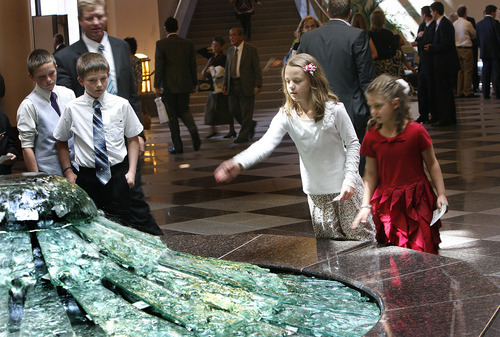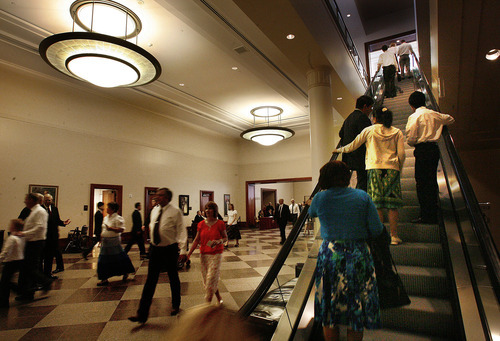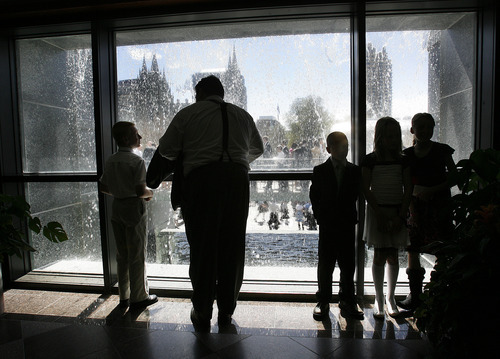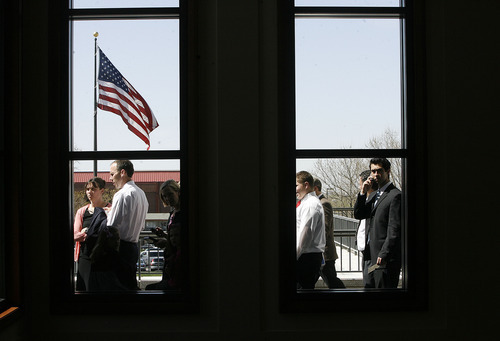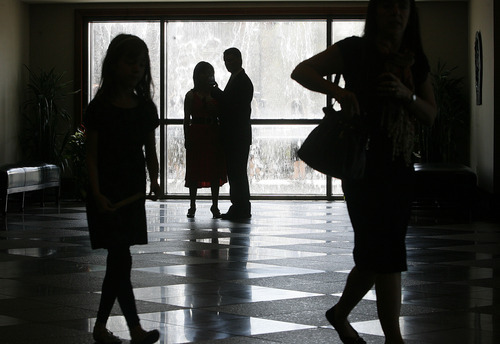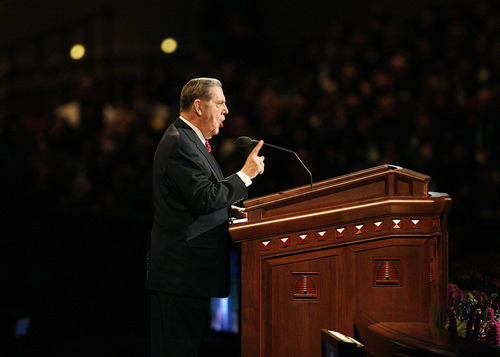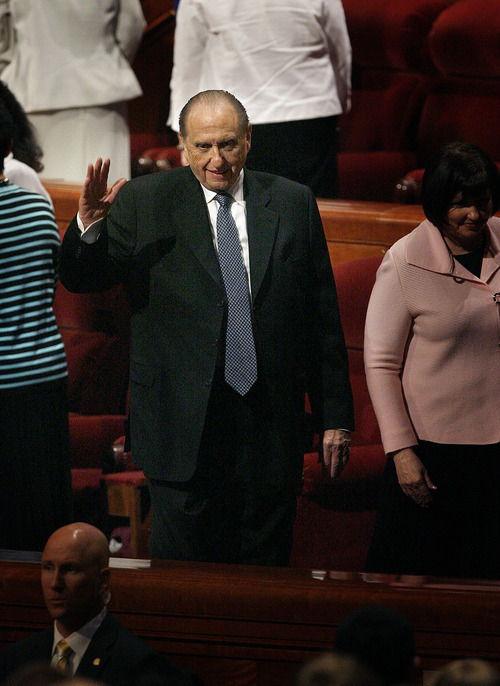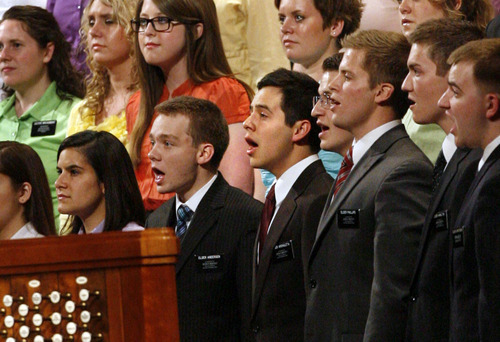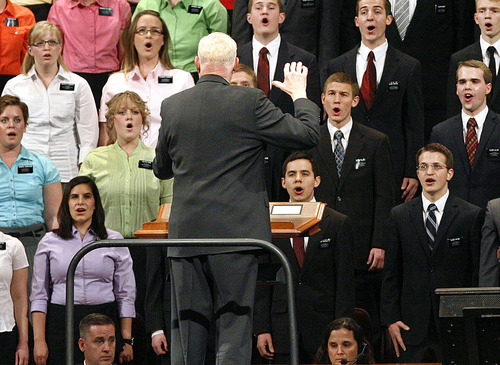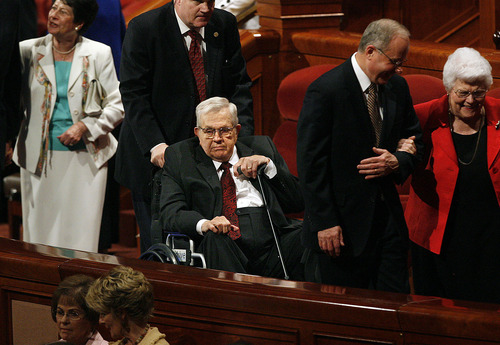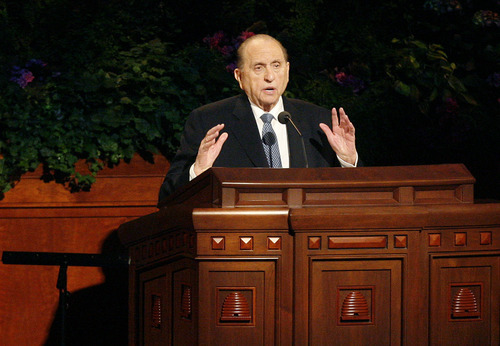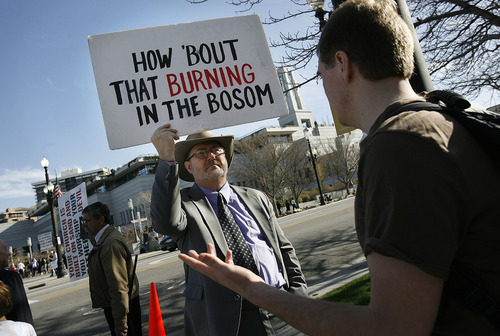This is an archived article that was published on sltrib.com in 2012, and information in the article may be outdated. It is provided only for personal research purposes and may not be reprinted.
Senior LDS apostle Boyd K. Packer on Saturday lauded the virtues of married couples nurturing their children — and the joy they bring — while lamenting the pain of abortion and the regrets that can follow.
Children are meant to have two parents — a father and a mother, Packer said during the opening session of the The Church of Jesus Christ of Latter-day Saints' 182nd Annual General Conference. "No other pattern or process can replace this one."
Speaking from his chair, the 87-year-old church leader, who heads the Quorum of Twelve Apostles, addressed more than 20,000 people gathered in the giant Conference Center in downtown Salt Lake City along with millions more watching via satellite in Mormon chapels across the globe, as well as on the Internet.
"One of the great discoveries of parenthood," Packer said, "is that we learn far more about what really matters from our children than we ever did from our parents."
He told about a college student who had an abortion and then later married the young man who had fathered the child. The couple went on to have other children, but mourned the loss of that one.
"She told me how tormented she now was to look at her family, her beautiful children, and see in her mind the empty place where that one child was missing," Packer said. "If this couple understands and applies the atonement [of Jesus Christ], they will know that those experiences and the pain connected with them can be erased.… Repentance and the lasting hope that forgiveness brings will always be worth the effort."
The apostle's remarks come in the wake of the Utah Legislature mandating a three-day waiting period before a woman can have an abortion in the Beehive State.
Packer, touting the precious moments of home life, also urged LDS leaders to beware of overextending parents with church assignments and instead allow them to be with their families.
"We need to provide the way, as leaders, for parents and children to have time together as a family," he said. "Priesthood leaders must be careful to make the church family friendly."
During the afternoon session, David S. Baxter, of the First Quorum of the Seventy, praised the devotion and efforts of single parents, especially mothers.
"Please never feel that you are in some kind of second-tier, subcategory of church membership, somehow less entitled to the Lord's blessings than others," Baxter said. "In the kingdom of God, there are no second-class citizens."
Contrasting emphases are a normal part of the twice yearly conferences, which feature speeches by many of the Utah-based faith's top leaders on a range of spiritual and doctrinal topics.
Mormons came together Saturday "as one, speaking many languages, living in many lands," LDS Church President Thomas S. Monson said in his welcoming remarks, "but all of one faith and one doctrine and one purpose."
The 84-year-old leader encouraged the faithful to "continue to oppose evil wherever it is found."
"There is much that is difficult and challenging in the world today," said the man 14 million Mormons view as a "prophet, seer and revelator," but he acknowledged "there is also much that is good and uplifting."
Apostle Dallin H. Oaks highlighted the sacrifices Christians — and especially Mormons — make for the faith and their families.
"Many Christians have voluntarily given sacrifices motivated by faith in Christ and the desire to serve him," Oaks said. "Some have chosen to devote their entire adult lives to the service of the master. This noble group includes those in the religious orders of the Catholic Church and those who have given lifelong service as Christian missionaries in various Protestant faiths."
But Oaks said most Christians are "neither expected nor able" to give their entire lives to such service. Instead, they show their religious devotions in their ordinary day-to-day lives. In that vein, he said, he knows of "no group whose members make more sacrifices than Latter-day Saints."
He pointed to the Mormon pioneers, who trekked from the Midwest to Utah. He noted the LDS Church's lay clergy, who donate much time in leading local congregations, helping fellow members and reaching out to the community. He also praised the 55,000-plus missionaries — young and old, men and women — serving across the globe.
"I believe that Latter-day Saints who give unselfish service and sacrifice in worshipful imitation of our savior," Oaks said, "adhere to eternal values to a greater extent than any other group of people."
President Henry B. Eyring, second counselor in the church's governing First Presidency, closed the Saturday morning session by identifying faith as the key to successfully passing through life's trials.
"If we have faith in Jesus Christ, the hardest as well as the easiest times in life can be a blessing," Eyring said. "In all conditions, we can choose the right with the guidance of the spirit."
Eyring said his mother battled cancer for 10 years. At her funeral, then-LDS Church President Spencer W. Kimball addressed the question as to why she had to suffer.
"Some of you may have thought that Mildred [Eyring] suffered so long and so much because of something she did wrong that required the trials. No, it was that God wanted to polish her a little more," Eyring said, quoting Kimball.
While that faith takes time to build into a firm foundation, Eyring said adversity can also help form and strengthen it.
In the afternoon, LDS apostle Jeffrey R. Holland urged members not to get caught up in envy of others.
"We are not in a race against each other to see who is the wealthiest or the most talented or the most beautiful or even the most blessed," Holland said. "The race we are really in is the race against sin, and surely envy is one of the most universal of those."
He also warned his listeners about holding too tightly to past hurts or issues such as a bad note at a piano recital, a spousal mistake or "an incident in church history that proved no more or less than that mortals will always struggle to measure up to the immortal hopes placed before them."
Even if a grievance "did not originate with you," Holland said, "it can end with you."
Apostle Robert D. Hales also spoke from a sitting position, with the sound of oxygen whirring into the microphone. He discussed the importance of covenant-making, particularly with the weekly sacrament ritual.
Apostle Richard G. Scott, the final afternoon speaker, offered tips on how to prepare for spiritual communication.
Avoid loud angry emotions, loud and abrasive language and inappropriate laughter, Scott urged. "A good sense of humor helps revelation; loud laughter does not."
On the positive side, the apostle suggested that "spiritual communication can be enhanced by good health practices."
"Exercise, reasonable amounts of sleep and good eating habits," Scott added, "increase our capacity to receive and understand revelation."
Communication with the heavens, he said, can also "be given in a dream when [there] is an almost imperceptible transition from sleep to wakefulness."
The two-day meeting continues through Sunday.
Donald W. Meyers contributed to this report. —
Mormons by the numbers*
Membership • 14,441,346
Stakes • 2,946
Missions • 340
Wards and branches • 28,784
Converts in 2011 • 281,312
Full-time missionaries • 55,410
Service missionaries • 22,299
Operating temples • 136
*As of Dec. 31, 2011
Source: LDS First Presidency



